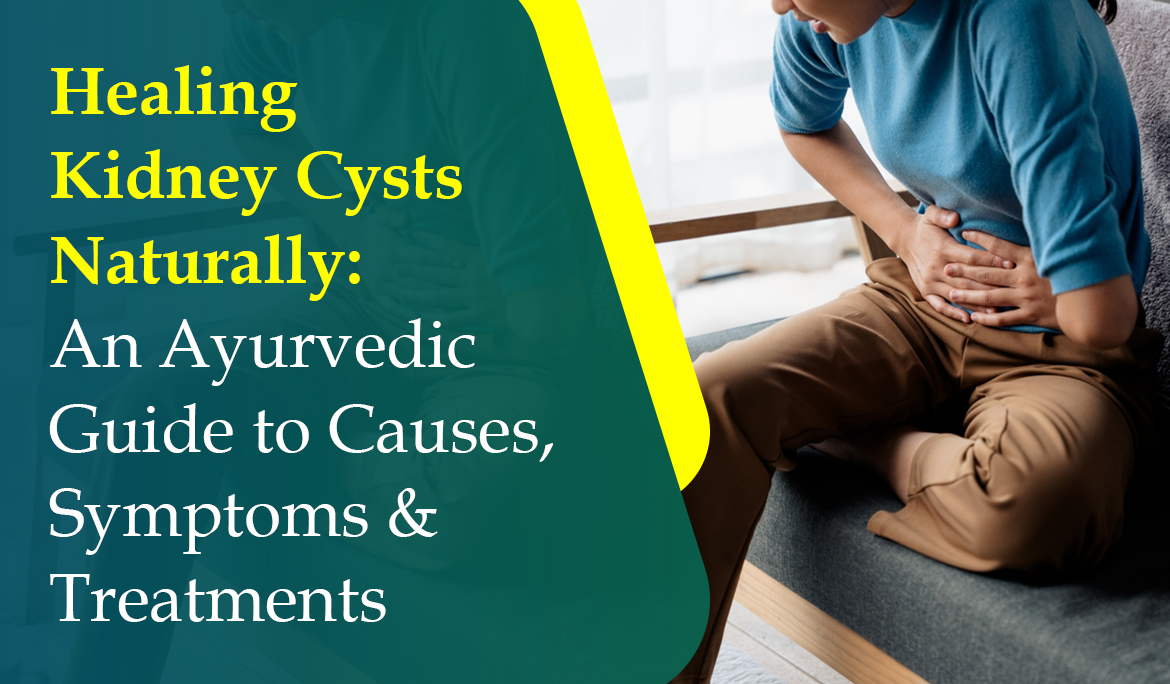In the quiet recesses of the human body, where the kidneys do the necessary work of filtration and detoxification, disruptions can sometimes go undetected – until they don’t. A kidney cyst may or may not cause symptoms and, in general, does not manifest as a serious health issue; however, if larger in size and more in number, it can become problematic. Modern medicine touts watchful waiting or surgery, for which, you can look to Ayurveda for an ancient, holistic alternative – one that does not merely bring awareness to the cysts, but focuses on the imbalances that lead to such symptoms.
Let’s discuss the Ayurvedic view on how to cure kidney cysts naturally along with the causes, symptoms and home remedies based on ancient wisdom.
What are Kidney Cysts?
Kidney Cysts Kidney cysts are fluid-filled sacs that develop on or in the kidneys. Most of these are “simple cysts” and do not cause harm. But in some individuals, especially with diseases like Polycystic Kidney Disease (PKD) cysts can proliferate, grow larger and disrupt the work of the kidneys which can cause complications like chronic kidney disease or kidney failure.
Interpreting Renal Cysts in the Light of Ayurveda
According to Ayurveda, all diseases are caused due to imbalance in the three doshas – Vata, Pitta and Kapha. Kidney cysts especially are most commonly associated with Kapha and Vata.
Kapha rules the structure and the fluid balance in the body. When it’s irritated, there may be too much fluid or growths – like cysts – may form.
Vata rules mobility and dryness, and when it is disturbed, it can obstruct the natural tissue development process and give room for abnormal growths.
Therefore, the Ayurvedic treatment of kidney cysts is aimed at balancing these doshas along with the detoxification of the body, with the rejuvenation of the kidneys.
Symptoms of Kidney Cysts in Ayurveda
According to the Ayurveda perspective, in the initial stages we cannot see any symptoms on the skin. But some of the signs are:
- Slight feeling of pain or discomfort in the lower back
- Tiredness, or feeling sluggish from poor detox.
- Frequency or color changes in urine
- Feeling heavy or bloated – many associate this with aggravated Kapha
- Changes in appetite or digestive problems
These signs are subtle and that is why the early Ayurvedic assessment like the pulse, urine and prakriti readings are essential for prevention and intervention.
Root Causes of Kidney Cysts in Ayurveda
As per the principles of Ayurveda, the main reasons behind kidney cysts are:
Improper Food Habits: Intake of too much of processed, raw, heavy or oily food harms Agni (digestive fire) and results in Ama (toxins).
Inactive Lifestyle: Absence of activity worsens Kapha and adds to the stagnation of fluids and tissues.
Unexpressed or Repressed Emotions: Chronic stress unsettles Vata and clogs the body’s pace for detoxification and rejuvenation.
Excessive Drug or Chemical Use: These substances can put pressure on your kidneys, disrupting the system’s natural filtration.
Recognizing these underlying causes is important from the Ayurvedic perspective, as the aim is not just to reduce the cysts, but to prevent reoccurrence.
Ayurveda for Kidney Cysts: A Holistic Healing Protocol
Ayurveda is not a one-size-fits-all solution. Instead, it zeros in on individualized, dosha-specific treatments. Here’s how:
Herbal Formulations
There are certain powerful herbs which play a vital role as Ayurvedic medicine for kidney cyst and these include:
Boerhavia diffusa (Punarnava): Known for its diuretic and anti-inflammatory properties.
Varuna (Crataeva nurvala): This tree bark extract is said to promote urinary health and reduce swelling.
Gokshura (Tribulus terrestris): This herb is a rejuvenating tonic that supports the renal function and promotes healthy urine flow.
Palash (Butea monosperma): Widely recommended in Ayurvedic remedy for kidney failure as it is a rejuvenating herb.
These herbs, if taken under the guidance of professionals, are able to make cysts shrink and restore impaired kidney structure.
Panchakarma Therapy
Healing begins with detoxification. Panchakarma: These are five cleansing treatments to remove excess toxins (Ama), rebalance the doshas, and purify the organs. Especially in kapha-vata, Basti (medicated and other types of enema) and Virechana (purgation therapy) are very helpful.
Diet and Lifestyle Changes
Both Ahara (diet) and Vihara (life style) are given equal importance in Ayurveda:
- Consume warm, easy-to-digest, lightweight food.
- Stay away from salted, fermented and upgraded foods.
- Stay hydrated, though, with herbal teas and lukewarm water.
- Add yoga poses such as Paschimottanasana and Bhujangasana to enhance kidney health.
- Make sleep, stress management and mindful eating non-negotiable.
These simple shifts have a profound effect on long term healing.
Zero Volt and Living Water Therapies
Some higher-order Ayurvedic organisations have also incorporated new age support modalities referred to as Zero Volt Therapy and Living Water Therapy into their natural therapeutic regimes – enhancing cellular function as well as detoxification.
Ayurvedic Treatment for CKD: A Gentle Yet Potent Alternative
When kidney cysts turn into chronic kidney diseases, Ayurveda becomes a kind gentle and root level support system. Many of the patients are supported to recover with personalized herbal medicine, special diet advice and lifestyle reformation, instead of having to be dependent on dialysis or invasive treatments.
It’s not only about managing progression but also reversing progression – enabling patients to get back to vitality, clarity and on the road to independence.
A Word of Hope: It’s Always Not Too Late
One of the most liberating things about Ayurveda is its belief in the body’s natural ability to heal – when the environment is balanced. Even when kidney cysts are just a piece of a larger renal problem, Ayurveda provides a way that is safe, non-invasive, and makes so much sense from the perspective of the body’s natural order.
If you want a personalized approach for CKD or if you want to seek a cure in Ayurvedic treatment for kidney disease, talk to the experienced practitioners who understand dosha analysis, pulse reading, and long-term wellness planning.
Final Thoughts: Where Modern Meets Traditional
Healing through the whole body is no longer the cheeky cousin on the fringe; it’s entering the mainstream of those who want long-term wellness and healing without the side effects, or worse, complications and surgeries. In fact, institutions such as HIIMS Premier are at the forefront of combining the wisdom of ancient Ayurvedic science with modern natural therapies, to help the common man fight diseases such as kidney cysts and failure, free from the shackles of toxic, heavy medicines.
If you’re interested in a drug-free, nature-guided approach to healing, consider taking the next step to full health with HiiMS Premier’s comprehensive healing protocol. Always make sure to consult a qualified Ayurvedic practitioner before beginning any treatment.
Remember, your kidneys are more than just filters – they’re keepers of your vitality. Handle them with the respect they deserve. Ayurveda shows you how.













